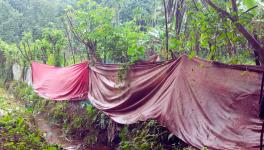COVID-19 in Rural India-XXX: Impact of Lockdown on Tea Plantation of Thettamala, Kerala
Representational Image.
This is the 30th report in a series that provides glimpses into the impact of COVID-19-related policies on life in rural India. The series, commissioned by the Society for Social and Economic Research, comprises reports by various scholars who have been conducting village studies in different parts of India. The reports have been prepared on the basis of telephonic interviews with key informants in their study villages. This report talks about the difficulties faced by plantation workers from Thettamala, Wayanad district amid the lockdown and the state government’s initiatives aimed at helping them.
In the wake of the COVID-19 pandemic, a nationwide lockdown has been in force in India since March 24. This has had an especially severe impact on rural India. For the plantation workers of Thettamala in Wayanad district, Kerala, the news of the lockdown brought with it a sense of fear and uncertainty. The plantation is their major source of income; the lockdown has resulted in the closure of the plantation, the halting of all activities and the workers being left with no jobs and no money.
Impact on Plantation Workers
Thettamala is a village in the northern part of Wayanad. The village is under the Thondernad Grama Panchayath and the Kanjirangadu village office. The Thettamala plantation is situated in wards 7 and 8 of the Panchayath. Most of the villagers depend on the tea plantation for their livelihood, but there are also male workers in the village who are agricultural labourers or construction workers.
Workers on the Thettamala plantation have not received their salaries for the past two months (January and February) due to a persistent financial crisis in the plantation sector. The workers have also not received their yearly leave encashment, which is another financial blow to them. The plantation management has issued a circular in which they explained that the financial crisis faced by the company was due to the decline in the price of the tea leaves, and that this had affected the timely distribution of wages to the workers. During and after demonetisation, the management had made arrangements to credit the workers’ dues directly to their bank accounts. However, this created difficulties for workers who were not used to operating bank accounts. These were the circumstances in which the plantation was forced to close on account of the lockdown.
In order to extend a helping hand to the workers during this period, the plantation management has provided emergency assistance of Rs 300 to workers and Rs 1000 to supervisors. However, employees have not been able to withdraw this amount since the money has directly been transferred to their bank accounts. It was also announced that this amount would be deducted from their salaries later.
According to a plantation worker named Kunjikrishnan (aged 58): “This lockdown has led the workers into financial crisis. Especially in a situation where the salary and other benefits are in arrears, the workers are left with no money. Even though some workers have their salary in the bank account, they cannot withdraw the money since there are no banks or ATMs in this area.”
There is no public transport available, so workers must walk six to eight km to go to the bank to withdraw whatever money is in their accounts. Fifty-year-old Zeenath says, “I do not use an ATM. I usually withdraw necessary money directly from the bank. When the lockdown was announced suddenly, I had no money with me. Two days back, when I was in need of money, I had to walk all the way to the bank. This was one among the difficulties I faced during this period of COVID-19.”
Additionally, many workers pawn gold for loans that will get them through periods of financial difficulty but they are unable to access this source of cash during the lockdown since it is difficult for them to get to the bank on foot, and because private gold loan companies are closed at this time.
The sudden declaration of the lockdown has taken the hardest toll on female workers, as they depend on their income from plantation work to run their households. Loss of employment at this time, especially for many single women, has brought significant financial distress.
Impact on other sectors
The lockdown has also caused jobs in all other sectors to dry up. Owing to the low wages in the plantation sector for some time, many male workers had moved to jobs in other sectors, like construction. But, even before the announcement of the lockdown, there had been a lack of jobs in the construction sector due to the unavailability of raw materials. Workers managed to get only three jobs per week on average, which was just about enough income to sustain their families.
Male plantation workers, who typically made about Rs 351 per day from plantation work, used to supplement their income with construction jobs twice a week. Forty-year-old Ratheesh says “The closure of the plantation sector and the stoppage of works in the construction sector have affected the wellbeing of the family. Often the financial needs were met by borrowing money and mortgaging the gold. In the present situation, this also has limitations.”
The region also has a number of coolie workers, and a long-running crisis in the agricultural sector had already drastically decreased the number of jobs available. Now, thanks to the lockdown, coolie workers have lost their jobs.
Workers who have retired from the plantation often work under the MGNREGA scheme since they cannot find any other jobs. However, these workers had received their wages regularly, and they have not had any work during the lockdown.
Initiatives by the Government of Kerala
With the permission of the central government, minor concessions have been announced for the plantation sector during the second phase of the lockdown. Fifty per cent of the workers will work three days a week and the rest of the workers follow the same pattern for the next three days. However, the workers say that it is difficult to sustain themselves on the wages paid for three days’ work, especially given the low wage rate in this sector.
Other interventions by the state government have provided some relief to workers. The community kitchen in the Thettamala region has provided food for plantation workers, other workers and the elderly, which has helped them avoid starvation. The state government of Kerala has announced a grant of Rs 1,000 each for workers in the months of April and May. Once this financial aid is delivered to the workers, they will be able to buy necessary items. The Welfare Fund Board has also announced a grant for non-plantation workers in the village. Additionally, the rice distributed by the state government to ration card holders via the public distribution system has been a source of relief. APL (Above Poverty Line) families are being given 15 kg of rice, while BPL (Below Poverty Line) families have received 35 kg. Apart from this, the government has also been distributing a kit containing 15 essential commodities to both APL and BPL households. Both the state government and local bodies have been actively involved in ensuring access to healthcare in the village and creating awareness among villagers about COVID-19.
Another initiative introduced by the Kerala government during this time is the distribution of convenient, easy-to-access and interest-free loans through Kudumbasree–Ayalkoottam (neighbourhood groups). As a part of this scheme, a family will receive an amount of Rs 2,000. Such loans have been useful to workers during past crises, such as seasonal floods. The Thondarnaadu Panchayath is also distributing milk to the plantation workers of Thettamala region during this COVID period. A ward member said that this scheme is being implemented to protect dairy farmers and to provide relief to the workers.
The author is a research scholar at the Centre for the Study of Social Systems, Jawaharlal Nehru University.
Also read: COVID-19 in Rural India-XXIX: Impact of Lockdown in Seloo Taluka, Wardha
Get the latest reports & analysis with people's perspective on Protests, movements & deep analytical videos, discussions of the current affairs in your Telegram app. Subscribe to NewsClick's Telegram channel & get Real-Time updates on stories, as they get published on our website.
























